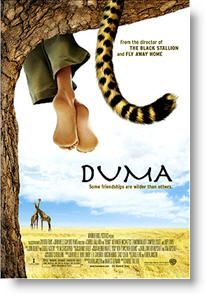Moving into the Real World—“Duma” Director Carroll Ballard discusses life and work
by Jeremy Landes
Contributor
Imagine: you get a phone call at work telling you one of your all-time favorite filmmakers is coming into town, and you’re invited to attend the premiere of his new movie. Afterwards, he’s going to answer questions from the audience. What do you do? First, you yell praises to God, then you tell your spouse why you need to miss another important obligation that evening, then you head out from work as soon as possible to avoid rush-hour traffic.
The movie is “Duma,” and the director is Mr. Carroll Ballard, creator of “The Black Stallion,” “Never Cry Wolf,” “Wind,” and “Fly Away Home;” the camera operator for “Star Wars;” an underappreciated film director who hasn’t made much in the last decade. You’re primed and ready to enjoy the film, and it does not disappoint. Then, Ballard comes up front and seems rather depressed. He doesn’t seem excited about being there… he seems tired.
Ballard says bluntly that the movie studio, Warner Brothers, was expecting a different film from him than the one he delivered. Reporter’s personal opinion: Upon seeing this film, you will not believe that any professional in Hollywood could/would have produced it for a “mere” 12 million dollars-it looks like 3 times that amount was spent. Nevertheless, Ballard states that the studio believes it will make most of its money selling the film on DVD, rather than giving it a wide release. Thus, they’ve decided to open “Duma” in Phoenix, San Antonio, and Sacramento, let it play for 2 weeks to see if people come, then pull it from theatres or open it in more cities. Audience members who just enjoyed “Duma” shout encouragements to Ballard, and one woman says they should work to improve the film’s Web site.
Ballard answers questions about what it’s like to work with animals, and he talks about how hard it is, compared with people. The director reveals that cheetahs like Duma aren’t actually very strong, but they’re fast. They kill their prey mostly through running after it and wearing it out, when many animals, if they chose not to run away, would be able to fend off the predator. Ballard talks about the “cute Bush Baby” (a rat-like creature with huge eyes)—how it pees on its hands in order to make them sticky, enabling it to crawl up any surface.
Later, in a phone interview, Ballard reveals that, as he directs, he often acts like a documentarian, allowing his camera to roll for long periods of time in order to catch the shot he needs from animals. Ballard says,
“I’m a big believer in a happy accident, and there’s always something that’s different. Sometimes the cat would do unpredictable things, so the actors would respond in different ways to it.”
When asked why he constantly returns to stories of children-with-animal movies, Ballard simply states that he’s making the kinds of movies Hollywood will allow him to make, though he would like to tell other stories. Such as? Like the story of Claudius and Gertrude, he says. Pausing, Ballard says, “You don’t know who Claudius and Gertrude are, right?” He explains they’re characters from Shakespeare’s Hamlet, and he wants to direct a prequel to that story. He seems pessimistic about his chances, though.
When Ballard is asked about his approach to life, as well as why he chooses to make difficult, visceral-style films, he says,
“I’m a big kid myself, and the most exciting things I can think of involve me getting involved physically somehow… I can relate to a sledgehammer, not a computer… I’m not into buttons. I’m attracted to stories that deal with primal emotions. I think a four-year-old throwing a temper tantrum may be living life to the fullest, and, as we grow up, those emotions are [evened out]. I want to move people into the real world and out of what we’re becoming, in our greed. I’m a real believer in human values… and if one has faith in his own mortality, then it helps unify people, since they see others as mortal, too.”
See my review of “Duma”.
